|
| |
|
|







|
|
TCHS 4O 2000 [4o's nonsense] alvinny [2] - csq - edchong jenming - joseph - law meepok - mingqi - pea pengkian [2] - qwergopot - woof xinghao - zhengyu HCJC 01S60 [understated sixzero] andy - edwin - jack jiaqi - peter - rex serena SAF 21SA khenghui - jiaming - jinrui [2] ritchie - vicknesh - zhenhao Others Lwei [2] - shaowei - website links - Alien Loves Predator BloggerSG Cute Overload! Cyanide and Happiness Daily Bunny Hamleto Hattrick Magic: The Gathering The Onion The Order of the Stick Perry Bible Fellowship PvP Online Soccernet Sluggy Freelance The Students' Sketchpad Talk Rock Talking Cock.com Tom the Dancing Bug Wikipedia Wulffmorgenthaler |
|
bert's blog v1.21 Powered by glolg Programmed with Perl 5.6.1 on Apache/1.3.27 (Red Hat Linux) best viewed at 1024 x 768 resolution on Internet Explorer 6.0+ or Mozilla Firefox 1.5+ today's page views: 3030 (34 mobile) all-time page views: 3269288 most viewed entry: 18739 views most commented entry: 14 comments number of entries: 1215 page created Sat Apr 26, 2025 12:47:54 |
|
- tagcloud - academics [70] art [8] changelog [49] current events [36] cute stuff [12] gaming [11] music [8] outings [16] philosophy [10] poetry [4] programming [15] rants [5] reviews [8] sport [37] travel [19] work [3] miscellaneous [75] |
|
- category tags - academics art changelog current events cute stuff gaming miscellaneous music outings philosophy poetry programming rants reviews sport travel work tags in total: 386 |

| ||
|
 Note specific usage of The Godemprah language ("scum"), alongside explicit alignment in naming Chinese citizens fighting against Ukraine, and accusing China of supplying Russia with arms (Source: msn.com) ...and not only because retail prices are likely gonna rise. With GEOTUS imposing tariffs totalling some 245%* on China following the latter retaliating like-for-like with 34% reciprocal tariffs on U.S. goods despite being explicitly warned not to do so, China has now doubled down with their own 84% tariffs beginning April 10th, before calling it quits on the "numbers game" at 125%. Seeing as tariffs are collected by governments from largely-private importers, one supposes a number of big countries having an easier time balancing budgets this year! However, it really isn't about the money at this point, and doubly so for Great America - if one thinks about it, if they want more U.S. dollars, they can just print it. Sure, we have noted in a previous exposition on Modern Monetary Theory that (rampant) money creation risks misallocation of resources and accompanying inflation, but one supposes the U.S. does not have either as their primary concern right now. As hinted in recent posts on Don TRUMP, it's not just about "how much shall I pay you", but about Strength, Respect and Strategy (srs). [*Originally just 104% when I started drafting this post; I generally prefer just whacking out the copy in a single sitting.] Strength "Strength" has always played a central role in The Greatest Game - Zelensky has, for example, often referred to America and TRUMP as being possessed of it, whether in the raw sense, or as applied to leadership (very true). Contrarily, China has repeatedly warned the U.S. off from a strength-based approach, while also lauding their own strength of confidence, the collective strength of their society and the "strength through unity" of the Global South, among less-gentle demonstrations. But, what is strength? With the understanding that the previous posts leaning on Liar Game manga have adequately explained recent geopolitical happenings before the fact (or, at any rate, not any less accurately than the mainstream media), let's borrow another manga to illustrate what's happening - because explaining is easier with nice pictures to look at: 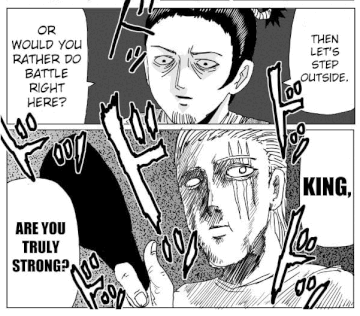 The challenge is made! [Embiggen!] (Source: mangadex.org) In the One Punch Man webcomic original, a coincidentally-Asian (Cold) warrior calls out the blonde and (Red, Made-in-China) baseball cap-wearing King**, popularly recognized as "The Strongest Man on Earth" - is he truly strong? That this should come into question is, admittedly, understandable - beset by internal crises within, and the rise of other heroes without, is the King really still the premier superpower of the world? After initial reluctance, the twain have a showdown: 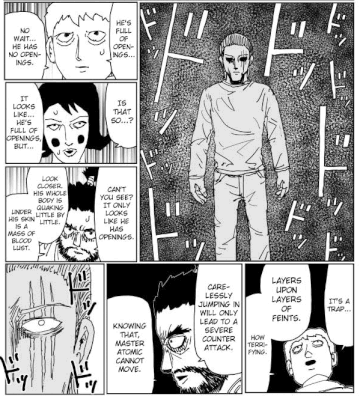 If only they could understand! 懂王妙计, 你懂么? [Embiggen!] (Source: mangadex.org) His challenger's disciples, being expert duelists themselves, understand the terror before them far more acutely than common bystanders (i.e. your average Redditor or newspaper columnist) would have - what the lesser-skilled mocked as inconstancy, they acknowledged as an infinitely-complex attainment, that pinnacle of the martial arts, "the stance that is no stance". Additionally, on top of that maximal (policy) flexibility, the King Engine was able to generate countless micromovements (i.e. a barrage of Truth Social posts), to lure and bedazzle the unwary; so-called "weaknesses" as identified by the rabble, were something other than they appeared. Given this, the Great King's opponent could only accept a standoff. And... before it happens... 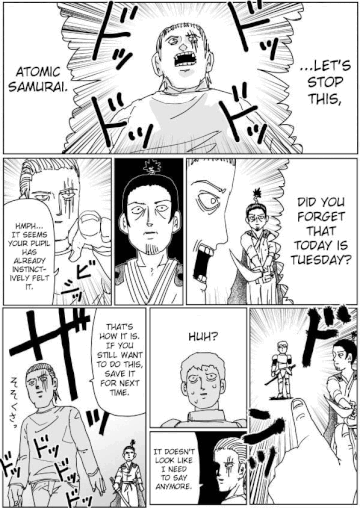 Before we blow up the world (more exposition follows)! [Embiggen!] (Source: mangadex.org) After some persuading, the bulk of King's opponents admit their defeat (i.e. with some 75 countries reportedly willing to negotiate improved terms for America)  Saying sorry is the hardest thing to do (Source: mangadex.org) But this, of course, but scratches the merest veneer of The Genius That Is The King: 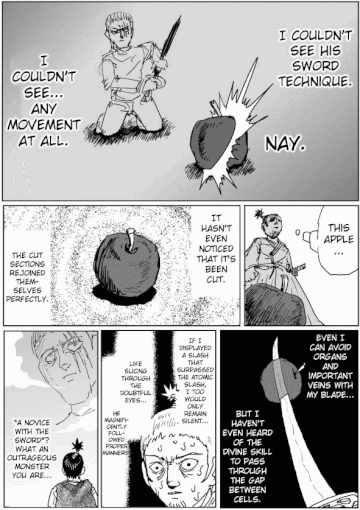 Truly, the [N.B. Not forgetting the movements specific to words...] [N.N.B. The manga adaptation, for the interested.] [Embiggen!] (Source: mangadex.org) Pretty fitting, given how far a few That's a strength too, one has to admit! And as for the globe being silently divided... I guess we'll witness more on that quite soon... [**Of course, in reality, despite the FAKE NEWS grudgingly bestowing upon TRUMP that royal title in past weeks, we have to respectfully correct this mistake; firstly, the memelord has been known in the deeper cybersphere as the (GOD-)EMPEROR, since his initial ascension back in 2016, notwithstanding his recent resurrection. Moreover, this is also a matter of propriety and proper precedence - given that Japan, their junior partner by any accounting, is headed by an Emperor, the leader of their nominal overlords should be of no lesser rank, even if denied out of misplaced modesty. One can understand if the deification part is held off for the moment, since apotheosis occurs only after the mortal term in the Roman tradition, but in any case recognition has already been done by various worshippers.]
An Economic Revolution for the (Golden) ages is now well underway, with the Global Reciprocal Tariffs of GEOTUS now in place and being collected by U.S. customs agents. 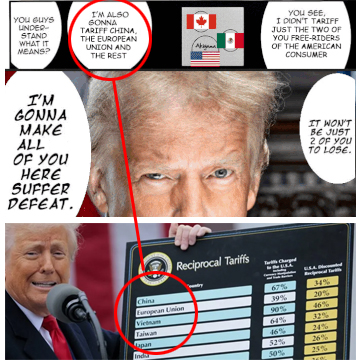 And in that very order! (Sources: That Mad Genius! from Feb 5, fulcrum.sg) It might be apropos to check on this blog's projections on the affair from February - which appear to be spot-on, thus far. China and the European Union headed a very long list of countries and territories now very kindly charged a discounted tariff rate by Great America, as apparently determined by the experts over at the Office of the United States Trade Representative. Online tinkerers have since reverse-engineered the formula used as more or less half the U.S. goods trade deficit divided by the total goods imported from a country, which is a... somewhat novel definition, to say the least. Well, we did repeatedly emphasize that all would be tariffed, which turned out to be even more comprehensive than expected; Singapore for one had a 10% tariff imposed despite our (goods) trade deficit with the U.S., to which our Ministry of Trade and Industry has (probably wisely) decided not to retaliate, given that it's already the baseline minimum being imposed. To this, our new Prime Minister has voiced concern that "we cannot expect that the rules which protected small states will still hold", which may be something of an understatement given recent changed circumstances. While online sentiment amidst an (expectedly) crashing stock market has not been very positive towards the tariffs, the rationale behind them has not been covered well - or fairly - by the mainstream media either. As again noted in early February here, the U.S. national debt and aggregate trade deficit is one thing, but the loss of their industrial base is another; this was echoed by GEOTUS in his official announcement on Liberation Day, in which reclaiming jobs and factories, supercharging the domestic industrial base and increasing production were declared to be the main drivers of the sweeping measure. And as to what end the returned industry will be put towards... odds are it would be the twilight struggle of Cold War II!  They're onto us too, dang it! (Sources: abc.net.au)
There has been less blogging with some pretty big life changes coming up (including a new [but not so new] job), so here's a quick post to get back into the swing. It's been some time since I have done a movie review (e.g. for Gods of Egypt in 2016, and Aladdin et al. in 2019, so here's one on Nezha 2, viewed in IMAX at Shaw Theatres Lido. I went for this without having watched the first instalment in what looks destined to be a drawn-out series (I'm holding out for the Nezha vs. Wukong crossover), and to be honest, I was pretty impressed - less by the CGI effects, though they were certainly grand and polished, but by the pacing and humour. Such cultural power by "soft persuasion" has been a department in which China has... not covered themselves in glory previously (a consequence of having a captive audience that's not exactly gonna be able to disagree with whatever messaging is being put out, under a one-party state), but they're getting a lot better, if box-office sales are any indication. It's already the highest-grossing animated film of all time, and fifth overall (above all the Star Wars flicks, to put this accomplishment in some perspective) The above could be slightly discounted by the fact that nearly all of its earnings (i.e. over US$2 billion of... US$2.1 billion) have been from the domestic market thus far, but let's not take too much away from this eminently-watchable action-comedy. It documents the bipolar hero (with accompanying sleep and dissociative disorders) struggle between the conflicting identities of demon and dragon, which is not resolved by his initial whole-body plastic surgery makeover. The story begins proper when his icy buddy literally perishes on the operating table (fine, a lotus-shaped table) after the unaccredited surgeon doesn't go heavy enough on the anesthesia, and after said buddy's dad threatens to escalate the matter up the chain of command, Nezha decides to enable a redo by winning the McGuffin, which involves passing three tests (the first trope of many). The first test involves Nezha beating up a bunch of adorable marmots, and after the next test has him chop the hand off an elderly kindergarten teacher in front of his horrified young students, Nezha begins to have serious doubts about whether he is the good guy after all. The anti-hero turn comes with a "Hello, my name is Nezha/Shen Gongbao/Ao Guang. You killed my father/master/son, prepare to die" triple combo special, in which miscellaneous family members are offed in quick succession to build up the stakes (one supposes possible CCP influence in emphasizing traditional familial ties and filial piety here, rather than the casual romances so prevalent in Western offerings). Enraged, Nezha goes on to kick the (admittedly large) behind of a lady of leisure minding her own business in her mountain retreat (hey, we never said that Nezha was a positive role model), concurrent with a Seafood Lives Matter uprising under the ocean. There's a heartwarming moment as the rehabilitated Red Dragon Army (more possible symbolism) troops exchange tako karaage and shark fin soup between themselves, before beating off the conniving White hegemons - or is that reading too much into it? While it has been said that Nezha 2 is best enjoyed with a deep understanding of its Chinese underpinnings, it takes care to throw in (and up) some universal fart and pee jokes; local Sichuan pride aside, there are numerous references (or maybe even rip-offs, if more uncharitably put) to global popular culture. For example, how can one miss the spin on the Evil Queen's famous scene in Snow White (or is it Fashionably Light Mocha nowadays?), where she questions her faithful magic mirror as to whether she is the "fairest of them all" (or, in these wokeist DEIs, the most fabulously tanned of all)? Telling the truth doesn't pay... And, in these trying times of rising unemployment and anti-immigrant sentiment, it's nice to see fellas reinvent themselves: 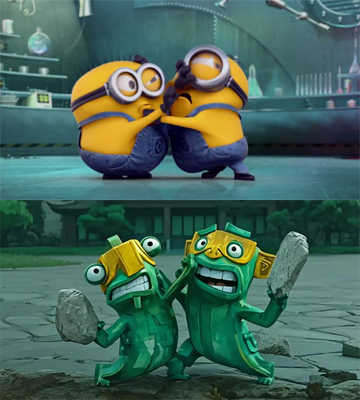 Guardians will be minions... (Sources: youtube.com, buddha3bodhi.com)
 A new model for international relations (Sources: kyivindependent.com, independent.co.uk) That wasn't that hard, was it (and guess what happens next)?
 Pure kino (Source: economist.com) [Modern adaptation of an old classic] FADE FROM BLACK: Int. of Don TRUMP's home office -day ZELENSKY (seated in pajamas in front of the Don's desk, facing the camera) I believe in America. America has made my fortune (cut to Burisma and Hunter Biden's extremely convenient unconditional pardon). I demand security guarantees! DON TRUMP I think you are skipping a lot of content there. At least you're all dressed up, I see. [Zelensky breaks down. The Don gestures to Vance to give Zelensky some lunch] Sorry... but not sorry. [Zelensky, taking the piss, goes off script] I -- I went to the United Nations, like a good Ukrainian. These Russians were brought to trial. The Security Council took three years and absolved them -- no sentence. No sentence! They went free that very day! I stood in the courtroom like a comedian. And that Putin bastard, he smiled at me. Then I said to my people, "for justice, we must go to Don TRUMP". DON TRUMP (apparently miming grabbing a pussy) Why did you go to the U.N.? Why didn't you come to me first? ZELENSKY: What do you want of me? Tell me anything. But do what I beg you to do. DON TRUMP: What is that? [Zelensky gets up to whisper his request into Don TRUMP's ear] That I cannot do. ZELENSKY: I'll give you anything you ask. DON TRUMP: Fine, investigate the Bidens. ZELENSKY: Uh, how about some minerals? DON TRUMP: We've known each other for many years, but this is the first time you came to me for counsel, for help. I can't remember the last time that you invited me to your house for a cup of coffee, even though my country is goddamn bankrolling your only hope. But let's be frank here: you never wanted my friendship. And you were afraid to be in my debt. ZELENSKY: I didn't want to get into trouble. DON TRUMP: I understand. You found paradise in America, got a good deal, made a good living. The Democrats protected you; and there were courts of law. And you didn't need a friend of me. But now you come to me and you say -- "Don TRUMP give me justice and security guarantees!" -- But you don't ask with respect. You don't offer friendship. You don't even think to call me GOD-EMPEROR. Instead, you come into my White House on the day our agreement is to be signed, and you ask me to do murder, for money. ZELENSKY: I ask you for justice. DON TRUMP: That is not justice; your country is still alive (barely) ZELENSKY: Then they can suffer then, as we suffer. (then) How many minerals shall I pay you? DON TRUMP (stands, turning his back toward Zelensky) Zelensky... Zelensky... What have I ever done to make you treat me so disrespectfully? Had you come to me in friendship - and in a suit - then this scum that ruined your country would be suffering this very day. And that by chance if a dictator man such as yourself should make enemies, then they would become my enemies. And then they would fear you. ZELENSKY: Be my friend -- (then, after remembering something as the Don shrugs) -- but first, security guarantees... DON TRUMP: Can you even believe this delusional fool?! You are not ready for justice or peace if I am involved, because you feel that my involvement gives you a big advantage. I don't want advantage, I want peace. You have disrespected the United States of America in its cherished Oval Office. You can come back when you are ready for peace, and not before. Oh, and no lunch for you. Good day, sir!
Several days after our previous update, our Glorious Orange Akiyama has indeed made his move:  Europe gets their collective panties in a bunch! [Embiggen!] (Source: mangakakalot.com) As it stands, the tariffs on Canada and Mexico are moving forward after insufficient bending of knees thereof, following this mostly-telegraphed (from October 2024) but still-very-funny development (that China/Yokoya might or might not have foreseen, as hinted in the last post) - as the GOD-EMPEROR cheekily dangled a US$21 million bid. Interestingly, certain Chinese subreddits appear to not want to acknowledge this big-brain 34D chess move by GEOTUS, which really only underlines his ability to remain severely underestimated by foes!
Precise terminology from the Feburary 5 post would be honoured as newly-installed U.S. Defense Secretary Pete Hesgeth warned the European Union against trying to make America the "sucker" in his NATO headquarters press conference a day or so back, as he further announced that the U.S.A.'s security priorities lay elsewhere (and somebody better step up and bid, like, US$20 million on Lockheed Martin hardware) China has to be suspecting something, surely?  That sudden realization? [Embiggen!] (Source: mangakakalot.com) The surfeit of self-righteous whining from Europe aside, India, Japan and South Korea have wasted no time in entering more mature deliberations (and concessions), with South Korea eagerly clarifying that they have a free trade agreement with the U.S. that resulted in an average tariff rate on U.S. imports of only 0.79%. This should greatly help their case in avoiding the worst of the reciprocal tariffs - or at least more than strange mainstream media articles claiming a "history of trade openness" in Asia (now where did that come from)? Probably more importantly, China appears to understand The Greatest Game that is going on, with their Foreign Minister now promising to "play along to the end", translated from 奉陪到底. Much citing of the classics followed, most prominently the famous I Ching opening 天行健,君子以自强不息*, rendered as "The movement of Heaven is full of vigour. Thus the gentleman [ref. China?] (follows suit and) makes himself strong and untiring" - with the (correct) disclaimer that it was hard to translate, and perhaps DeepSeek could help. 也许有好戏看了! By the way, Robert F. Kennedy Jr. has been confirmed as Health Secretary - right after Tulsi Gabbard got installed as Director of National Intelligence - which should only amp up the entertainment value of what's probably going to happen. Since I'll be off to Finland for a week or so, more discussion on those (wise) appointments will have to wait. 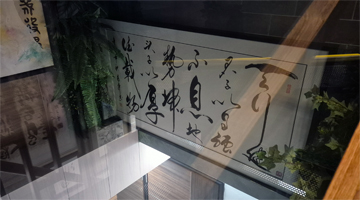 [*Currently coincidentally hanging over my main door; in part the motto of my high school, and a number of Chinese educational institutions.] |
||||||||||||||||||||||||||||||
 Copyright © 2006-2025 GLYS. All Rights Reserved. |
||||||||||||||||||||||||||||||